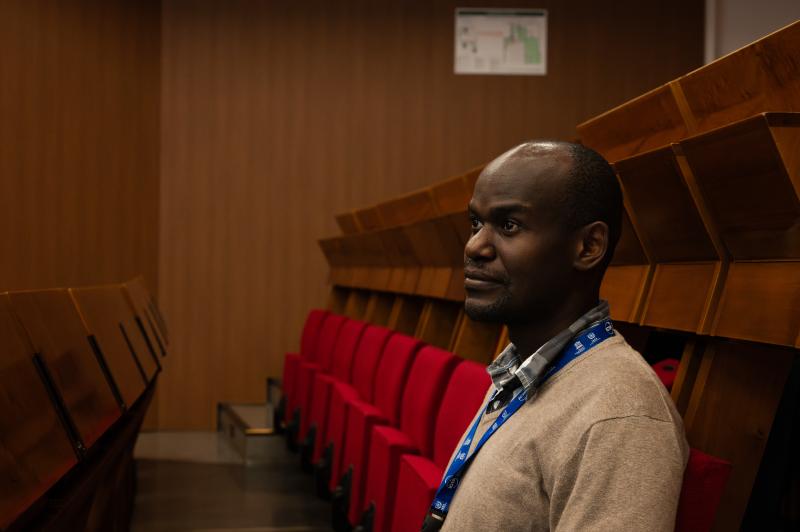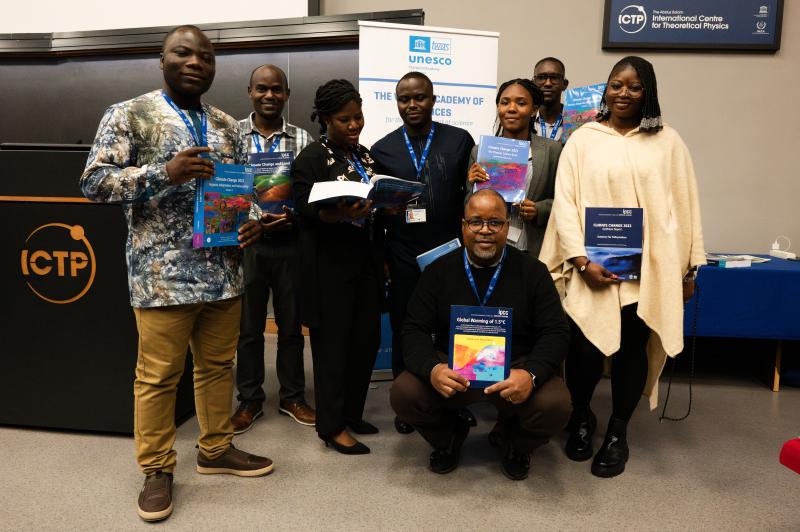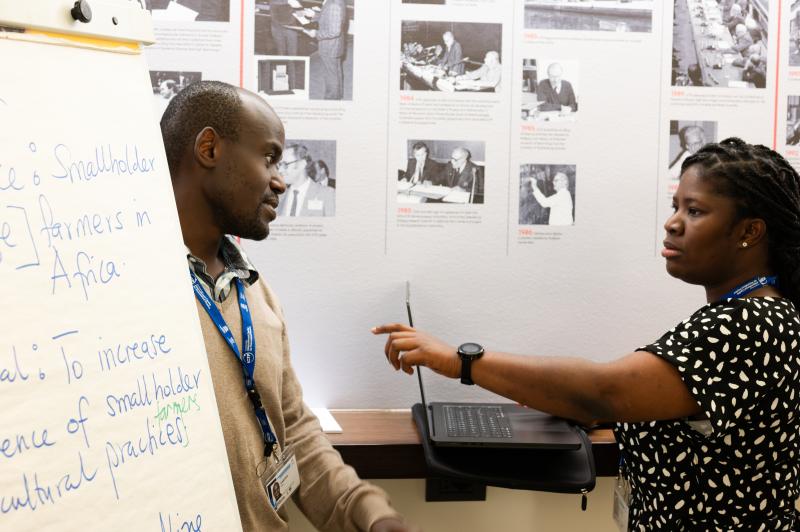When Peter Kabano was invited to the TWAS workshop that addressed climate issues at the international level, he welcomed the news as an opportunity to expand his competence in this field, address the challenges of effective communication about this topic, and receive unique training on how the IPCC works.
Kabano, a geospatial data scientist from Uganda, is a past recipient of two Intergovernmental Panel on Climate Change (IPCC) scholarships. The TWAS workshop, which hosted IPCC experts, appeared to be an excellent chance of scientific growth.

The event, held in Trieste on 14–16 May, brought together 47 scientists from 36 developing countries. Its purpose was to familiarize them with the IPCC’s working methods and leverage expert insights. Through this initiative, TWAS equipped climate scientists from developing countries with the knowledge they need to support evidence-based action with governments, international organizations, and other parties.
Among the participants were 12 PhD students supported by the TWAS-Sida PhD Scholarships for Climate Research for Students from Least Developed Countries (LDCs), financially supported by the Swedish International Development Cooperation Agency (Sida).
The workshop titled Joint Climate Science Network, Mentorship, and Capacity Growth was realized through vital funding from the David and Lucile Packard Foundation. Sessions were led by climate experts and featured several IPCC contributors, including IPCC Vice-Chair Ladislaus Benedict Chang'a. Discussions centered around the findings of IPCC’s Sixth Assessment Report, delivered in 2021, and included considerations on the upcoming Seventh Assessment Cycle.
Kabano, a project manager with Global Risk Assessment Services, has long nurtured a keen interest in how cities are affected by climate change and their impact on the climate. Beyond urban ecology, he harbours a passion for uncovering hidden patterns within big data.
In this interview, he explained how sensor technology, biodiversity, and sustainability intertwine.
Q. When did your interest in climate issues begin?
A. I think an interest in climate issues has been sitting in the back of my mind since an early age. But it was only in recent times that it has fully come up. In particular, it was the year 2000 when I realized the impact of events like the mosquito migrations, whereby malaria mosquitoes that were normally living in warmer low-land areas migrated to higher altitudes, spreading the infection where it was not present. This is how I decided to focus on climate issues.
Q. You have received two IPCC Fellowships. What was the subject of your research?
A. With the first fellowship, I studied how urbanisation results in a unique urban climate, and how this, in turn, changes the seasonal patterns of green spaces. Green spaces are important for ecosystem services like air quality, and regulation of heat and moisture. It is critical to understand better how they function, and how their loss affects quality of life.
With the second fellowship, I could focus on devising innovative solutions to retrieve environmental data for understanding the benefits of green spaces using low-cost sensor networks. These are smart sensors distributed across a city that are able to collect and transmit data and to communicate with other devices, as opposed to manual data acquisition. Scientists fetch data continually and record long-term series of air temperature, air quality, soil moisture, and humidity to understand the influence of urbanisation and the benefits of green spaces.

Q. You are passionate about searching for hidden regular patterns within huge amounts of data. How do big data and the climate interconnect?
A. According to the Satellite Catalog, we now have almost 30,000 satellites orbiting around the Earth, which send an endless flow of data around the clock. They take images of the Earth from a distance at regular intervals that vary with the specific purpose of the research they were built for. But most of this data is not being utilised to its full potential. What I try to do is to find regular patterns suggestive of an event, a change in climate patterns, or environmental problems.
Q. You are an expert in urban ecology. What is that exactly?
A. When people talk about ecology they think of forests, rivers, valleys—undisturbed environments. But cities are very much perturbed and represent a unique ecosystem that needs to be looked at, very different indeed from undisturbed forests. Cities experience peculiar conditions stemming from the presence of buildings, concrete, cement, and albedo—the sunlight that is reflected by windows of skyscrapers.
This creates a weird climate, which differs from place to place, according to the amount of concrete, the height of buildings, and other variables. So, I try to spot and decode a pattern of 'regularities' that could be used in the future to predict urban climate changes. This is relevant because the majority of the human population currently lives in cities and this trend will only increase.
Q. Did this workshop meet your expectations?
A. This event was the icing on the cake, as it put me in touch with climate scientists with whom I can develop ideas. I was excited to attend the workshop, thinking that I could also start contributing to the assessment reports. I'm definitely keen to explore avenues for making a contribution, although I'm not an IPCC fellowship recipient anymore.

Q. What new skills did you acquire during the event?
A. I realized the importance of an efficient networking system and was inspired by the insights shared by some speakers. I have always been interested in building a network of climate scientists in Uganda, or even in East Africa, and now I am inspired to work on it. This could be expanded regionally and involve colleagues from Rwanda and Nigeria, creating a solid cluster of proactive experts. This workshop has set the structure for acting upon this idea.
Q. Do you plan to engage in outreach activities?
A. It's a good point. The goal of my last IPCC project was producing sensors that measure the temperature. We explained the project to students in schools in Kampala, and it was a success. So future plans definitely involve working more with schools, because young students need to be exposed to and learn about climate change and the environment. Personally, I am inspired to work with the youth, who represent the majority of the population in Uganda.
Q. What were the added values of the TWAS workshop?
A. Mentorship, networking, sharing ideas, and confronting with colleagues: this workshop gave me all these, and I am really thankful to the organizers for the rich programme. Now I see a clearer direction and it's really nice.
(Edited for clarity)
Cristina Serra

